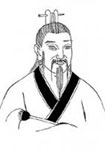“应是壶中别有家”的意思及全诗出处和翻译赏析
诗词类型:
《赠韩道士(一作张佖诗)》戴叔伦 翻译、赏析和诗意
《赠韩道士(一作张佖诗)》诗词的中文译文如下:
日暮秋风吹野花,
夕阳余晖中,秋风吹拂野花,
The evening sun sets and the autumn wind blows through the wildflowers,
上清归客意无涯。
仙人归去,意境无限。
The Daoist returns to the realm of immortals, his thoughts boundless.
桃源寂寂烟霞闭,
桃源的烟雾笼罩,山谷的远方已隐没,
The Peach Blossom Land is quiet, enveloped in mist and haze,
天路悠悠星汉斜。
上清的仙路遥远,星汉斜挂。
The road to heaven stretches far, with the Milky Way slanting.
还似世人生白发,
仿佛世间人长白发,
It seems as if people in this world grow old with white hair,
定知仙骨变黄芽。
我知道那是仙人体骨化为金黄仙芽。
But I know it's the bones of immortals turning into golden sprouts.
东城南陌频相见,
在东城的南陌频繁相遇,
We frequently meet each other on the southern paths of the eastern city,
应是壶中别有家。
一定是在壶中有一个家。
It must be that there is another home within the gourd.
这首诗词表达了作者对韩道士(或张佖)的赠词和祝愿。诗中通过描写日暮秋风吹拂野花、桃源寂寂烟霞笼罩等景象,表达了对道士归去仙境的羡慕和向往。诗中的“世人生白发”则暗示了道士已成仙,仙骨变为黄芽,具有神秘和神奇的意味。最后两句“东城南陌频相见, 应是壶中别有家”则表达了作者对道士壶中世界的好奇,认为道士已有了自己的家园。
整体上,这首诗词以唐代时期的意象,描绘了人们对道士仙境生活的向往和神秘感。通过对自然景物的描绘,以及对道士身份和归宿的暗示,传达了诗人对道士的敬仰和祝福。
《赠韩道士(一作张佖诗)》戴叔伦 拼音读音参考
zèng hán dào shì yī zuò zhāng bì shī
赠韩道士(一作张佖诗)
rì mù qiū fēng chuī yě huā, shàng qīng guī kè yì wú yá.
日暮秋风吹野花,上清归客意无涯。
táo yuán jì jì yān xiá bì,
桃源寂寂烟霞闭,
tiān lù yōu yōu xīng hàn xié.
天路悠悠星汉斜。
hái shì shì rén shēng bái fà, dìng zhī xiān gǔ biàn huáng yá.
还似世人生白发,定知仙骨变黄芽。
dōng chéng nán mò pín xiāng jiàn, yìng shì hú zhōng bié yǒu jiā.
东城南陌频相见,应是壶中别有家。
“应是壶中别有家”平仄韵脚
拼音:yìng shì hú zhōng bié yǒu jiā
平仄:仄仄平平平仄平
韵脚:(平韵) 下平六麻
